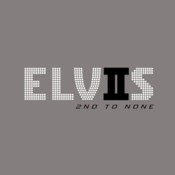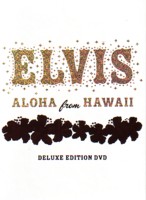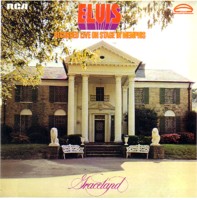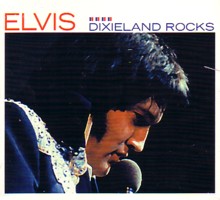WorldTitle
Fight 2003: "Elvis vs The Beatles"
At
Stake: the Title of Undisputed World Champion of Accredited
Sales
Principal
Tactical Devices: 'Elvis 2nd To None' and 'Let It Be Naked'
RIAA
Progress
Score: The Beatles 165 million units; Elvis 103 million units
Betting:
'Elvis 2nd To None' - 3 million sales worldwide; 'Let It Be
Naked' - 10 million sales worldwide and another #1 Hit for
The Beatles
Predicted
Winner: The Beatles (furthering
their already enormous lead over The King!)
"I
think this is the biggest accolade you can be given because
it means your fans have gone out and bought your records.
And that's why we make records - for our public." Sir Elton
John at the launch of the RIAAŽ DiamondŽ Award, 16 March 1999
| In
the past few years EIN has published a series of articles
('Elvis Lacks Credibility' and 'Elvis vs The Beatles')
that provoked a strong, largely negative response from
readers. With discussion now centering around the relative
failure of the 'Rubberneckin' single and (to many) the
comparatively poor performance of 'Elvis 2nd To None',
we thought it was time to fuel the debate. As
with our earlier articles we expect to receive a considerable
degree of 'negative' response. In our defence we hope
that most readers will understand that we are Elvis
fans, but Elvis fans who refuse to uncritically accept
unverifiable rhetoric on Elvis' sales. |
 |
A
lot has been written about the relative sales failure of 'Elvis
2nd To None' compared to 'Elvis 30 #1 Hits'. As a follow-up
release it was never expected that '2nd To None' would repeat
the global sales success of '30 #1 Hits', which has, to date,
sold almost 10 million units worldwide. And let's acknowledge,
this is a fantastic achievement!
There
is however another issue. Both BMG and EPE maintain a public
dialogue about Elvis' position as the biggest seller of records
and CDs in the world with claimed sales exceeding 1 billion
units. Taking the USA as a case in point, it is well documented
that official RIAA certifications (albums, EPs and singles)
account for around only 200 million sales, ie. only one third
of the claimed 600 million US sales cited by BMG.
Various
arguments have been put forward to account for the "missing" 400 million sales including:
- the
price of some budget albums being under the RIAA certification
threshold;
- pre
RIAA period sales (the RIAA was formed in 1958);
- missing
sales figures post RIAA implementation (RCA's fault, not
BMG's); and
- unaccounted
for sales above one certification threshold but below the
next threshold.
Food
for thought: Elvis is currently ranked as the #4 all-time
album seller in the US with 103 million units accredited.
The Beatles are #1 (164.5 million), Led Zeppelin #2 (106 million)
and Garth Brooks #3 (105 million). The Eagles round out the
top 5 with 86 million units.
Elvis
could well overtake both Garth Brooks and Led Zeppelin in
the next few years. However, if Garth Brooks releases another
major album it is likely to sell 5 to 10 million copies and
Elvis will then be way behind! The
release of 'Let It Be Naked' this week will see The Beatles
stretch their lead in the #1 spot.
In
EIN's view these arguments are certainly valid but fail to
prove the missing sales to the extent required. They are supposition
rather than provable fact. They also require that you apply
the essentials of the argument to most if not all releases.
This is not a reasonable thing to do as it assumes a consistency
unlikely to be the real case.
Our
view is influenced by evidence published in 'Elvis Day By
Day' by Peter Guarlnick & Ernst Jorgensen. In 'Day By Day',
the authors provide sales figures for Elvis singles and albums
from 1956 to 1977. Examining these figures it is obvious that,
in many instances, Elvis' sales were nowhere near as big as
has been claimed (carefully consider the following with BMG's
more recent statement on Elvis' sales slump requiring a new
marketing strategy).
A
few examples: In his liner notes for 'Elvis 2nd To None',
Ernst Jorgensen stated: "...2002 proved that the music of
Elvis Presley is as alive today as it has ever been."
Nice
rhetoric, but flawed when we consider BMGs earlier public
statement that in recent years Elvis' sales had slumped dramatically
and a new marketing strategy was needed. 2002 was a special
year but Elvis' success can be attributed to three factors
that together formed a powerful symbiosis:
- the
phenomenal success of 'Elvis vs JXL', fuelled by huge global
promotion with its inclusion in the Nike ad for the Soccer
'World Cup';
- BMG's
biggest ever Elvis marketing campaign for 'Elvis 30 #1 Hits';
and
- the
use of Elvis music and an Elvis sub-plot in the Disney movie,
Lilo & Stitch.
Elvis'
music being as alive today as ever is also a clever way of
expressing where Elvis stands as a recording artist. If we
take a slightly different perspective or interpretation, one
could argue that logically it follows his sales should mirror
those of "today's" biggest selling artists on a consistent
basis. Unfortunately this is not the case.
New
albums from The Beatles and Garth Brooks will routinely sell
at least 5 million units in the US. The Beatles '1' album
sold around 23 million units worldwide compared to 9 million+
for 'Elvis 30 #1 Hits'. In the US The Beatles '1' is certified
Px8 while '30 #1 Hits' is only 3xP. A recent 'flavour of the
month' artist, Norah Jones, is also 8xP with her album 'Come
Away With Me'.
To
date, Elvis' biggest selling album in the US is the "budget
priced" Camden album, 'Elvis' Christmas Album' with 8 million
units accredited. Along side that release at 8xP are two albums
from The Beatles: '1' and 'The Beatles Anthology Vol. 1'.
Let's take a quick look at other USA album sales figures:
Some
of the Biggest Selling Albums (in the USA) of All-Time:
28
million: The Eagles: Their Greatest Hits
26
million: Michael Jackson, Thriller
22
million: Led Zeppelin IV
19
million: The Beatles
16
million: The Beatles 1967-1970
16
million: Garth Brooks, No Fences
15
million: The Beatles 1962-1966
15
million: Garth Brooks, Double Live
What
these examples suggest is that while Elvis is a popular seller
TODAY he is not in the same league as The Beatles, Led Zeppelin
or Garth Brooks as a seller of albums. That is, his appeal
is usually limited in the broad CD buying market.
EIN
poses three questions:
1.
Why did at least 8 million Americans buy the most recent albums
from The Beatles and Garth Brooks, but only 3 million bought
Elvis 30 #1 Hits?;
2.
Should we accept that Elvis album sales will not consistently
rival those of the major album artists?; and
3.
Where are all the Elvis fans?
If
we look broadly across all RIAA certifications it would be
reasonable to assume that based on RIAA figures Elvis is on
a sales level similar to The Beach Boys (recently two of their
albums, 'Endless Summer' and 'Made in the USA' were certified
3xP and 2xP respectively). Even Billy Joel recently had his
album, The Stranger' certified 10xP (Diamond status) by the
RIAA, a level never achieved by Elvis. The Beatles, Garth
Brooks and Michael Jackson all have numerous album titles
with certifications well above 10xP!
As
noted earlier, Elvis' best is the Camden budget Christmas
album with sales exceeding 8xP. One aspect of the possible
answer to why less people buy an Elvis album compared to a
Beatles album is the different marketing strategy adopted
by BMG.
New
releases for The Beatles and Garth Brooks are well spaced,
usually with no more than one relase every 1 to 2 years. But
look at the Elvis marketing strategy: in 2003 we have had
the Close-Up boxset, a deluxe edition of Elvis 30 #1 Hits,
Christmas Peace and Elvis 2nd To None. And this doesn't take
into account the myriad of special releases licensed by BMG
through various retailers.
Also,
BMG insists on "repackaging" Elvis' greatest hits, Elvis'
greatest love songs, Elvis sings Country etc. How many greatest
hits compilations does a fan need? BMG's marketing strategy
for Elvis relies on the ageing hard core fans.
Consider
the following excerpt from a news article:
"Meantime,
the most posthumously prolific artist of all time, Presley,
will deliver at least three releases this year, one of them
a four- disc treasure trove of previously unavailable material
from old films, Nashville studio sessions and a 1972 concert.
Despite the fact that Presley has released about two discs
each year - some with new material, some merely repackaging
old songs - there's no danger of oversaturating the market,
says Michael Omansky, the consultant who oversees RCA's
Presley catalog.
"Not
as long as you have a hard-core fan base that wants the
stuff," Omansky says. "I think as long as you handle the
entertainer with class and make sure everything is done
right, with no cheesiness and good value for the consumer,
you're OK." It's possible that even the tackiest tribute
is better than no tribute. Richman notes that many film
stars of the 1920s are unknown today. "Families try and
keep the memory alive," he says. "But most of these people,
they do eventually die, believe it or not."
Elvis
Himself & His Fans Partly To Blame: Tangential to this,
the marketing of Elvis is partly Elvis' own fault. His ability
to sing just about any genre of music (rockabilly, rock & roll, country, pop, ballads, blues, soul, gospel, latino and
semi-operatic) fuels the endless repackaging of eclectic greatest
hits, country, love songs et al releases. Hence, an Elvis
Christmas Album will do well at the festive season, an Elvis
gospel album appeals to a niche market etc.
Elvis'
musical strength is also his marketing weakness! Also, enough
fans continue to buy the endless BMG "repackages" of Elvis'
recordings to generate a healthy (if at times wobbly) profit
for the company. So why should they change tactics? EIN believes
that together with The Beatles, Elvis is the biggest seller
of records and CDs in the world. However, we are concerned
that the "rhetoric" of 1 billion sales cannot be substantiated
and that in the face of ongoing corporate "smoke and mirrors",
Elvis' sales are still significantly below that of new releases
for The Beatles, Garth Brooks etc. How many units will the
upcoming special edition of 'Let It Be' sell?
EIN
reasonably predicts that unlike the mediocre sales of the
remastered 'Elvis That's The Way It Is' and 'Suspicious Minds'
album releases, the new Beatles album will sell more than
10 million units globally! Some people will argue that sales
is only one factor that should be considered (the argument
is analagous to the one we have about the merits of the Billboard
Hot 100 Singles Chart, a chart heavily biased to airplay rather
than sales). And while there is some truth to this, the reality
is actual sales are the one 'hard' measure we can refer to
in measuring relative popularity. When people part with hard
earned money to buy something they want, it says something
important about their psychological and emotional attachment
to the purchase.
Comments
on the various Elvis messageboards about initial sales for
Elvis 2nd To None were a mix of disappointment and praise
that after 26 years Elvis has two Platinum albums in 12 months.
Yes, this is a great achievement but it ignores the above
points. Food for thought: on the Elvis Collectors messageboard
recently, a posting mentioned that it was a "pretty impressive" achievement for Elvis to register two top 10 hit albums 26
years after he died. Perhaps, but doesn't this miss a bigger
point, ie.: The Beatles haven't recorded for more than 30
years but they still regularly hit #1 on album charts worldwide
and sell huge numbers!!! Rationalisations to support Elvis'
smaller number of sales are a nice sentiment but avoid the
bigger issue.
The
Keys to Bringing Elvis to the Contemporary Market - Rationalisation
of product and strategic "focus"
EIN
considers that BMG should "take time out" from milking the
Elvis product through the release of numerous profitable albums,
but ones that, on average, hardly register on the important
charts nor sell in substantial numbers. It will take years,
but given the seminal nature and importance of Elvis' music
it should be possible to strategically market his appeal to
a "regular" buying public of not one million but five to ten
million. The key to bringing Elvis to a younger audience is
not by marketing his greatest hits. The music scene has evolved
considerably since the 1950s & 1960s and generally speaking
Elvis' greatest hits packages appeal to an older demographic
who grew up on his eclectic, evolving style. Today's core
album buyers don't want an album full of eclectic recordings.
They want consistency of feel.
BMG
needs to identify the key genres of Elvis' musical output
that will apeal to today's buying public and strategically
market accordingly. Arguably, Elvis' Memphis sessions in 1969
with their heady mix of country soul and fresh pop could be
exploited as could his often overlooked rhythm and country
soul recordings in the Stax Studios in 1973.
As
an example, I came across this great artwork and excellent
track listing for a "dummy" BMG Elvis album on the Elvis Collectors
messageboard: For this approach to work, fans and the general
public need a long break from that material and a "rationed"
Elvis release schedule! Part of this also requires that BMG
significantly reduce their "over marketing" of albums to the
hard-core of fans who will but each and every variation of
the Rubberneckin' single or 2nd To None album.
It
requires effort to develop and market all these variation
products, an effort that is then 'not available' for directing
at a strategic, long term strategy. BMG must stringently "focus" its efforts on the long term, not the short term.
Profit
versus artistic credibility and public acceptance? EIN wonders
which way BMG will go?
Click
for follow-up article: 'Nigel eats humble pie!"
Elvis vs. The Beatles - The Matrix Argument
Click
to comment on this article
|







